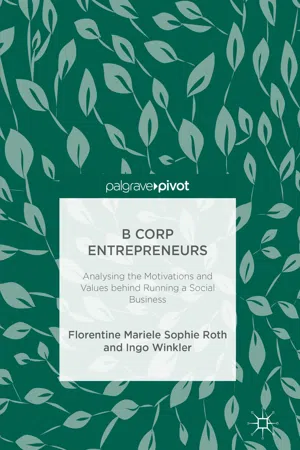Background
According to WWF (2016), the way current economic and political systems is set up, human development is coupled with environmental degradation and social exclusion. In the last 50 years, biodiversity has declined by 58% affecting not only wild animals and plants but also humans suffering under the deteriorating state of nature. Current human behavior requires the regenerative capacity of 1.6 earths to cover the products and services consumed each year (WWF, 2016).
Unsustainable choices made by individuals, businesses, and governments are encouraged through systemic failures inherent to the prevailing systems (Sabeti & the Fourth Sector Network Concept Working Group, 2009; WWF, 2016, pp. 12ff). These include elements such as the gross domestic product (GDP) as the global measure for well-being and the concomitant strive for infinite economic growth, the prioritization of short-term gains over sustainable long-term gains of many economic and political models, and the externalization of social and environmental costs (WWF, 2016, pp. 12ff). Social and environmental costs are increasingly recognized as “byproducts and unintended consequence of organizational design” (Sabeti and the Fourth Sector Network Concept Working Group, 2009, p. 1), and also Metcalf and Benn (2012) point out that the dominant business model will threaten human survival in the long run.
Chile is traditionally classified as a wealthy Latin American country due to its high economic growth rate compared to its neighbors, its low inflation rate and closeness to full employment (Ramos Arriagada & Castillo Gatica, 2013). Its high GDP per capita of US$ 23,367 for 2015 (World Bank, 2017) makes Chilean society as a whole seem well-off. However, Chile’s Gini coefficient of 0.465 for 2013 (OECD, 2017) compared to the average Gini coefficient of 0.318 across OECD countries shows that it is distributed in a highly unequal manner. Dramatically increasing protests since 2011 led by students, ecologists, labor unions, and indigenous minorities further reflect a different reality of the well-being of Chilean society (Ramos Arriagada & Castillo Gatica, 2013).
According to economist and Nobel Peace Prize winner Muhammad Yunus (2010), the biggest flaw in today’s capitalist structures and underlying theory is the misrepresentation of human nature. In the present economic system, human beings are interpreted as being one-dimensional with the sole desire to maximize profit, leaving out any other relevant political, social, environmental, spiritual, and emotional aspects in life. Selfless motivations driving human behavior are not considered by economic theory, although clearly represented in the existence of institutions other than profit-making entities like charities, foundations, or nonprofit organizations.
A fundamental change in the global economic system is unavoidable to solve humanity’s most pressing needs (Yunus, 2010), like poverty, hunger, inequality, and decreasing natural resources (UN, 2017). Responses need to be designed that trigger sustainable modes of consumption and production and promote the perspective of a planet with finite resources (WWF, 2016). Due to the fact that it is private businesses that nowadays exercise direct control over the majority of global resources and play a decisive role in employment, these become central in the generation of fundamental change (Abramovay, Correa, Gatica, & Van Hoof, 2013). The needed changes consequently require breaking with existing paradigms and designing new forms of organizations and governance distinct from business as usual (Abramovay et al., 2013; Hoffman, Haigh, & Badiane, 2010; Birkin, Cashman, Koh, & Liu, 2009; Birkin, Polesie, & Lewis, 2009; Stubbs & Cocklin, 2008). These must go beyond CSR practices attempting to reduce negative impacts but consist of the building of a regenerative economy with new competencies and capabilities that finds ways to generate positive social value (Porter & Kramer, 2011; Birkin, Cashman, et al., 2009; Birkin, Polesie, et al., 2009).
In this context, new forms of organizations have emerged globally that blur the boundaries between the for-profit and nonprofit sector by adopting social and environmentally driven missions while generating profit to sustainably accomplish those missions (Haigh & Hoffman, 2012). This type, often referred to as hybrid organization (e.g. Haigh & Hoffman, 2012; Boyd, Henning, Reyna, Wang, & Welch, 2009; Pache & Santos, 2013), demonstrates viable new business models that generate mutually enriching correlations among economic, social, and environmental value creation . Among these new hybrid alternatives to business as usual are so-called blended value organizations, new profit companies, nonprofit enterprises, social businesses , and B Corporations (Sabeti et al., 2009; Yunus, 2010; Stubbs, 2014).
Different alternatives for breaking with the traditional way of doing business and the emergence of different types of hybrid organizations have also presented themselves in Chile. The B Corp is one type of hybrid organization (Pileika, 2012; Troncoso Campos, 2014) promoted by the B movement originated in the United States that gains increasing attention. With a steadily growing number of Chilean B Corps and the movement’s South American representation based in Chile’s capital, it is among the most important alternatives in the Chilean ecosystem (Sistema B, 2017).
B Corps , in Latin America called Empresas B, are a new type of business form that amplifies its fiduciary duty to shareholders as well as non-financial interest groups (FOMIN, 2014). This implies an obligation of distributing profits to shareholders while simultaneously taking their social and environmental impact into consideration. The overarching goal is to create a positive triple impact in the economy, society, and environment by using the forces of for-profit businesses. Being certified as a B Corp means to meet the highest standards of verified social and environmental performance, public transparency , and legal accountability (B Lab, 2017). As a new type of hybrid organization , B Corps seem to exhibit a high social innovation potential and to be better equipped to productively address certain types of market failures than the public sector and civil society (Liger, ...
